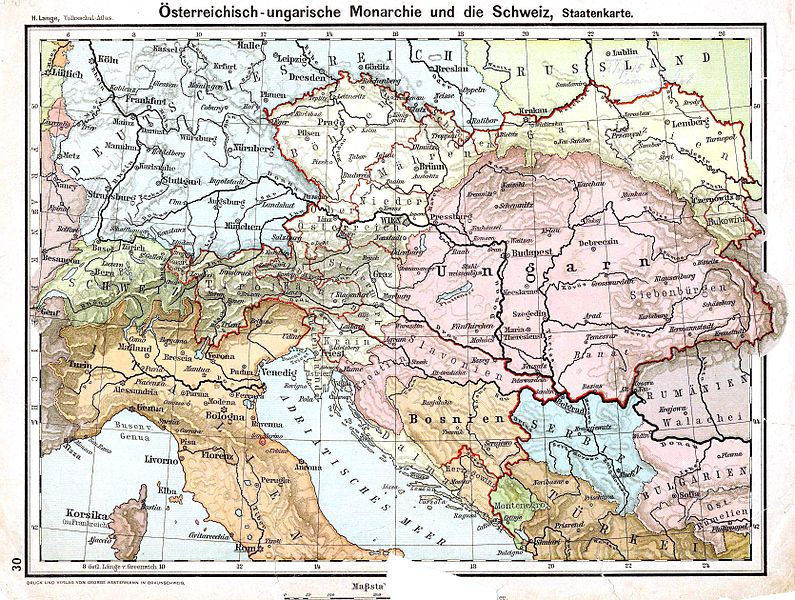
In the highly unlikely event that anyone in publishing even vaguely remembers me in ten years’ time, it’ll be for this analogy. I can live with that.
It was at Frankfurt last year, on a Tools of Change panel with Brian O’Leary and Sheila Bounford, that I first started wittering on about the Austro-Hungarian Empire and how publishing should learn from its demise.
My theory was that content publishing might perhaps be understood in terms of Europe on the verge of the First World War. With a little creative thinking, each of the main players could be seen as one of the up-and-coming powers about to fight that war. Amazon, a relative newcomer nonetheless intent on domination, was clearly Germany. Apple, already possessor of one mighty empire in the form of its enormously successful devices, yet eyeing another – that of content publishing – was Russia. Google, uncertain whether it wanted to be part of content publishing at all, yet behaving arrogantly when it did choose to engage (in the form of its book scanning activities) was evidently Britain.
At the time, the most appropriate equivalent for what those so keen to insist that they are the future call ‘legacy publishers’, seemed to be Austria-Hungary: a once-great empire teetering on the edge of irrelevance, and which the imminent European conflagration would consign to history. (Later discussions with people who actually know about this period in history have suggested that the Ottoman Empire, now Turkey, might actually be a better equivalent here, but let’s stick with Austria-Hungary for the moment.)
The point of my analogy was that it was in publishers’ interests to do all they could to prevent, or at the very forestall, any conflict that might lead to one of these three players gaining dominance. To do this, I suggested, they needed to be behaving in two particular ways. In the short term, they should be negotiating loose alliances that might help maintain a balance of power. (The alleged collusion of five of the “big six” publishers with Apple certainly fits this description.) They should also be working more closely with those start-ups and smaller players who offered alternative routes to markets: the likes of Kobo and 24 Symbols, whose equivalents in this analogy might be, say, Belgium and the Netherlands.
Meanwhile, they should be preparing for battle, rearming rapidly to ensure that in any future conflict they would have at their disposal the very same weapons that the other powers would have in their possession: specifically, systems built to handle digital products (and adaptable to changing circumstances), and a direct route to market.
Almost a year on, circumstances have indeed changed, and the analogy has moved on too, leaving behind its loosely historical origins to move into counterfactual territory. America, in the form of the United States Department of Justice, has entered proceedings on the side of Germany, and if outright war has not yet broken out, then it certainly seems imminent: Judge Cote, who decided last week to disregard the submissions of more than a hundred parties to approve the terms of Hachette, Simon & Schuster and HarperCollins’s surrender (sorry, ‘settlement’), may yet turn out to be our very own Gavrilo Princip.
What brought the analogy back to mind, however, was the increasing furore over authors buying Amazon reviews, and using fake, pseudonymous accounts to praise their own work and bad-mouth those of their rivals. Though I’ve little to add to that particular debate – almost everyone accepts that this is shamefully poor behaviour by the writers concerned – it does perhaps reinforce this sense that we’re approaching a critical point in publishing’s history. Though ‘legacy’ publishing itself has never been entirely squeaky-clean, the structures that support it have tended to adapt themselves to changing circumstances in ways that lessen the risk of corruption: the unsigned reviews of the nineteenth century, for instance, ultimately gave way to signed reviews, as the need for accountability came to outweigh the freedom to express one’s opinion freely without fear of personal consequences.
The sort of lawlessness exemplified by the current spate of sock-puppetry, however, is classic early post-imperial behaviour: as empires decline, they lose the ability to enforce their authority, and the codes that had previously governed their subjects also lose their influence. And this may be a more significant implication of the current phenomenon: that we’re so far down the road towards war that the rules that we’re accustomed to no longer apply. If history is any guide, this state of lawlessness will not last long, but the rules that ultimately fill the vacuum won’t be ours, they’ll be those of the victor.
Originally posted on Futurebook on 10 September 2012